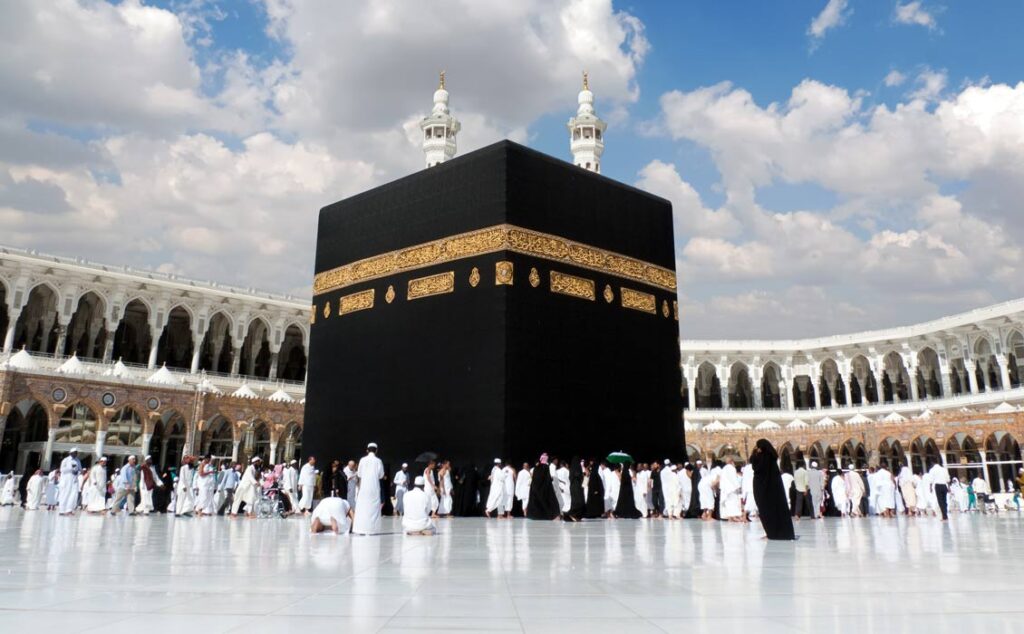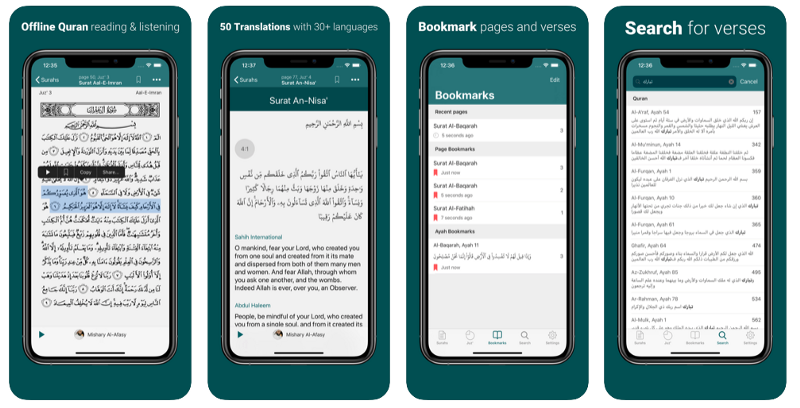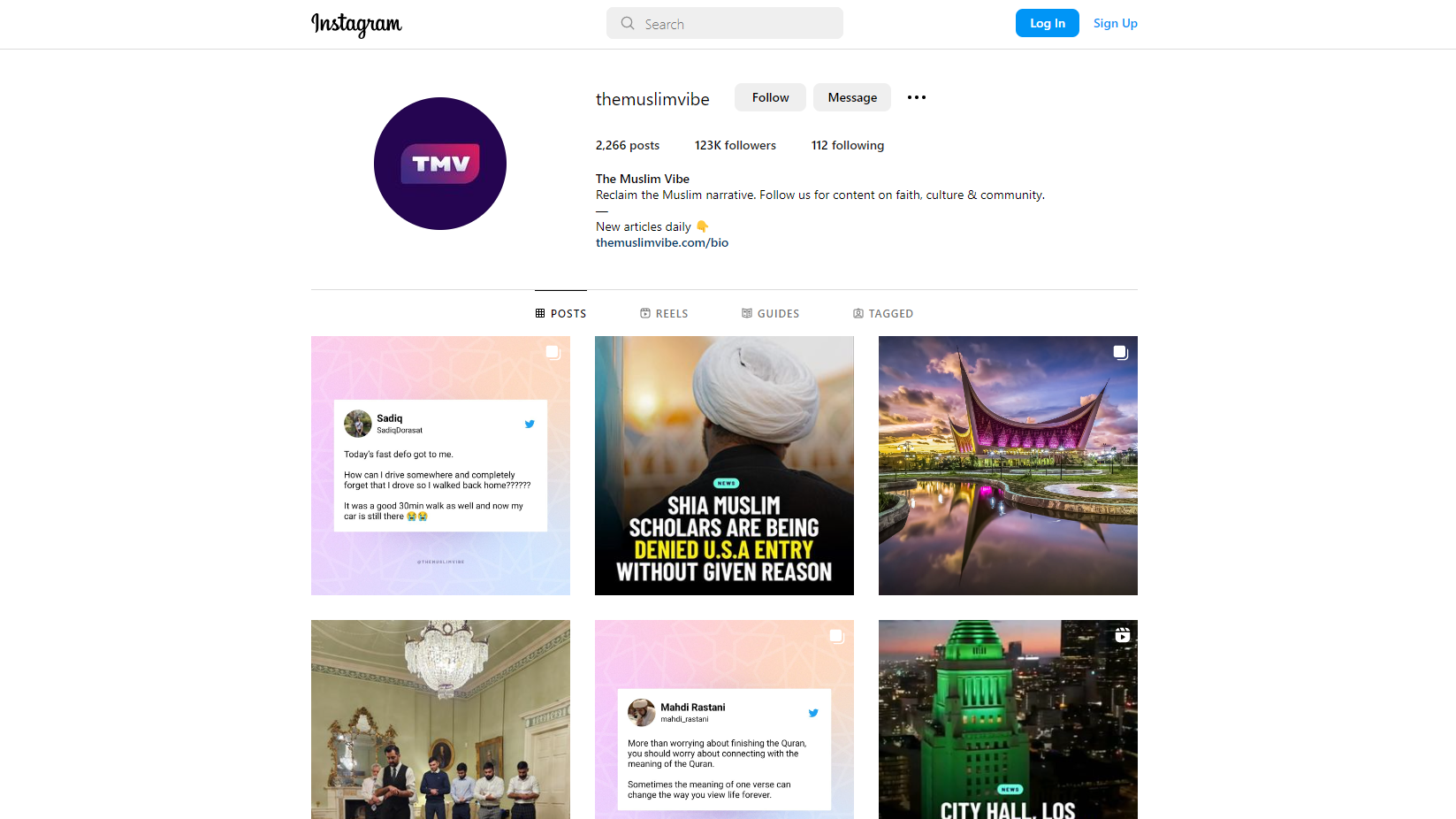This week I want to focus on the religion of Islam, mainly because it is Ramadan. Ramadan is a cherished and devout time for all Muslims since this is the time where fasting and recitations of the Holy Quran are done daily for 30 days. The fasting period is from sunrise to sunset, and no food or water can be consumed. The purpose of fasting is to allow Muslims to better themselves in their religious practices and their morals or values. Although it can be difficult to fast every day for a month, Ramadan allows Muslims the time to recognize the importance of familial and other relationships, and to center more on charitable actions. Islam in its entirety enforces these good habits, and there is a plethora of digital innovations that facilitate followers in reaching their spiritual or religious goals.
One notable facet of technology that is used in Islam is at the Kaaba. The Kaaba is a holy site located in Mecca, where hundreds of thousands of Muslims complete Hajj every year. Hajj is an Islamic pilgrimage that must be done by every Muslim at least once in their lifetime. Once at the Kaaba (pictured below), Muslims will recite a prayer continuously while circling the Kaaba. During the COVID-19 pandemic, one effective way the Saudi government made sure of controlling the capacity of visitors was by distributing individual high-tech ID cards that connect to mobile applications. These ID badges helped the government track individual pilgrims’ movements and were used as a form of payment for surrounding businesses or shops as well. Even pilgrims’ attire can be laced with nanotechnology, that helps in killing bacteria and making the cloth water resistant. The Saudi government clearly took very advanced measures during the pandemic to ensure a safer Hajj for Muslims.

After the pandemic, the Saudi Arabian government still implemented their crowd control technology. Millions of people travel from all over the world to Mecca, so using facial recognition technology and thousands of cameras and security systems allows for a safer pilgrimage on a massive scale.
Digital innovation has shaped other aspects of Islam as well. Since the release of smartphones, Muslims have no longer had to rely on carrying a physical copy of the Quran or other prayer books because there are now applications that allow full access to a digital copy. These apps go even further in helping Muslims maintain their practices by accompanying lines of the Quran with live recordings to aid in pronunciation and English translations of each line. Additionally, numerous applications utilize the smartphone’s built-in compass to show the correct direction of prayer. All Muslims pray towards the Kaaba, regardless of where they are located, so the convenience of using one’s phone to ensure prayer is done in the right direction assists Muslims globally, especially during the holy month of Ramadan when prayer is more frequent.

Lastly, the most effective component of digital innovation in Islam is social media. Various social media platforms such as TikTok and Instagram are used to promote Islamic practices and create a community for collective worship. Popular accounts such as The Muslim Vibe and Quran Sayings influence believers and non-believers about the teachings of Islam and guide them to recite daily prayers. For example, during Ramadan several Islamic accounts will post about important information regarding the holy month such as sunrise and sunset times, specific Duas, or prayers, that Muslims can recite, and reinforce important concepts relayed from the Prophet Muhammed (SAW). On the other hand, there is a rise of more liberal and western influences on Muslim social media users, which most Muslim scholars or Sheikhs believe to be a negative impact on the religion. Some argue that social media changes followers’ views on traditionalism and conservatism in Islam and their religiousness and piety. The overarching goal of social media, however, is to create a communal network for spreading the word of Allah (God) and safeguarding Islamic practices.

Technology and its endless capabilities have allowed not only Muslims but believers of other religions and philosophies to further expand their knowledge and practices. I look forward to seeing more changes in global religious observations with the innovation of technology and AI. Thank you all for reading and Ramadan Mubarak to those who celebrate!

Love this post, Nazneen! I love how people have embraced digital innovation to enhance their experiences during their pilgrimage and also to enhance their daily prayer lives also. The app that you mentioned in your blog is cool because it aids in people’s quest to maintain their practices. The live recordings and translations are definitely useful for people to follow along with the prayers and aid in pronunciation, particularly for new devotees and believers who are just starting out. It is great to see this wonderful integration of technology to enhance religious practices and I can’t wait to see how it improves as the years’ progress.
Hi Nazneen! Great post. I love the topic of your blog post, it’s nice to learn more about a certain religion and how technology is impacting it, especially during Ramadan. I had no idea such technological efforts were taking in Mecca during the COVID-19 pandemic, but i’m really glad they were! That definitely helped stop the potential spread of COVID, especially during such a special month.
The applications developed for the Quran is really cool too! I have a few Muslim friends, and they sometimes struggle figuring out the direction they should pray in. However, the applications being able to show the correct location is really practical and effective! Furthermore, I feel like I personally have learned a lot about the Islamic religion through social media, and I am excited to learn more 🙂
What a great post! I love the creative topic choice and the digging in to the various aspects. We tend to think of digital innovation mainly in terms of cool startups, but I love analysis like this about how digital can change (presumably for the better) these practices that existed way before and beyond the modern world. Great post. Love it!
This was a brilliant topic. This one immediately caught my eye when I read through the posted blogs. I could read an incredible amount on this topic. It does scare me slightly thinking about how authorities are able to track through facial recognition all across the world. It makes me wonder who all knowns what about me. It is a fascinating question, but this is an extremely well written blog post, thanks for enlightening me.
Hi Nazneen! This was an incredible post. It was so interesting to learn about the nanotechnology to make sure that the pilgrims’ attire was safe from the bacteria. I like how you mentioned the app that has the digital copy of the Quran, including the English translations. Thanks for sharing, this was a great post!
Hi Nazneen, this is a very unique post! I like how you started with an overview of Ramadan and Islam as a whole because it helps show the true impact of tech innovations on the religion. I found it really interesting how Saudi Arabia used high-tech ID cards and facial recognition to make visiting the Mecca a much safer experience during the pandemic. Also, I have definitely noticed the benefits of smartphones when it comes to religion with apps that include holy texts and platforms like TikTok and Instagram that promote important messages/practices for different religions. Overall, I really enjoyed reading this post and it was very informative!
Wow, Nazneen! What a great post, I loved the focus and niche expose. Honestly, the entire time I was reading your post, I was just thinking of Disney World. When there are that many people inflowing, especially from a border/government perspective, you have to track to ensure security. Regarding TikTok and IG, I see the same thing in music, where it democratizes access but reduces loyalty.
Hey, Nazneen! Cool post. I found this super interesting and informative, especially as someone who doesn’t know a lot about the Muslim faith. I definitely never thought about how technology impacts religious holidays like Ramadan, so its interesting learning about these apps and using those ID cards during the Hajj pilgrimage during the pandemic to control the number of people. I’m interested, which of these innovations do you think has been the most impactful regarding Islam?
Having access to the Quran and other Islamic texts is undoubtedly so impactful. The convenience of it really allows you to further practice your faith anywhere and anytime in the world, just from your smartphone!
Hi Nazneen! Smartphones have made everything way more convenient. It can now serve as a compass, wallet, and Quran for people traveling to Mecca, and I find this fascinating. I also like how you closed your blog by noting the benefits of social media in religion. The reach that social media has allows people to be well connected to a religious network, and this undoubtedly one of the best uses of social media.
Nazneen, this is awesome! Thank you so much for sharing and offering some insight and more understanding about Islam and Ramadan. I really thought that the app with the compass was really interesting too, I had always heard that Muslims did pray towards the Kaaba but never understood the logistics of how that was done so I’m sure the app helped a ton. And I think about having my Bible on my phone as being incredibly convenient so seeing other Abrahamic religions doing the same is really cool as well 🙂 Thanks for sharing and Ramadan Mubarak to you as well!!
Hello Nazneen, this was a great idea for a post! Many of my friends use apps for different things such as prayer times, and it was cool to see them develop over the past couple of years. I do see a lot of benefits of social media on the religion overall, with the goal of many users to inform the public about the religion.
Hey Nazneen, this post was really interesting to read about. It is fascinating the impact the technology has to spread religion throughout the world, considering when Islam was founded it was spread by word of mouth. Super exciting stuff and can’t wait to see what other technological advancements will be made within the religious realm.
Hi Nazneen! Thank you for sharing your insights on the use of technology in Islam, particularly during the holy month of Ramadan. It’s interesting to see how digital innovations have helped Muslims in various aspects of their religious practices, from tracking movements during Hajj to accessing the Quran through mobile applications. It’s also noteworthy how social media has become a platform for promoting Islamic practices and creating a community for collective worship.